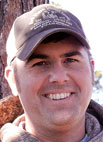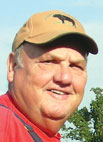 One way to live the farming life in Arkansas is to own your own place. Another way is to work the farm for someone else and have the pleasure of living on the land. That’s what Nick Dearmore and his family do. The farm, located in Marion County just south of Yellville, Ark., is owned by Dwain Hawkins, but Nick is the day-to-day manager of the place.
One way to live the farming life in Arkansas is to own your own place. Another way is to work the farm for someone else and have the pleasure of living on the land. That’s what Nick Dearmore and his family do. The farm, located in Marion County just south of Yellville, Ark., is owned by Dwain Hawkins, but Nick is the day-to-day manager of the place.
Nick said, “I started out working for Dwain part time, then I went to full time. But last fall I started doing bulldozer work and it just worked out better for me and him both for me to feed the cows and take care of them. When they need to be worked, I do that also. I take care of them like they were mine, and Dwain comes out every day.”
The 1,100-acre farm supports 100 commercial cow/calf pairs. Nick feeds them out to about 600 pounds and then sells them. Nick said, “When we first started about three or four years ago, he (Dwain) had bought cows and they were getting old. It was either buy cows, or replace them, so we actually did both. You know that to maintain your cowherd, you’ve got to keep a certain amount of heifers and you don’t know for sure if they are going to calve or have problems. So we try to keep back 10 or 12 heifers each spring and fall.”
Nick said they try to break up the calving as best as they can, so they have 10 spring-calving heifers and 10 or 12 fall-calving heifers. He added, “We’ve got probably 20 replacement heifers. We raise our own so we know what we’re getting.”
One of the unique aspects of Nick’s herd is that they AI their cattle. Tom Murray of Big Branch Breeders Service is their provider. It’s working out well for them. Nick learned how to synchronize and breed the cattle so that they birth within a few days of each other. He said, “Last year we had 40 calves in two weeks. The conception rates are usually about 60 percent, but last year we got about 80 percent. That’s pretty good.”
They had trouble with bulls getting hurt. “It seemed like every time we turned around we had one with a sore foot, or they’d get to fighting each other,” Nick said. “So every time we’d go to use them, we’d have one of them crippled.” When they AI them, every one of the cows is coming in heat that same day, so they’re getting bred quickly. They have consistent calves, and the quality is there. Nick said, “With AI we know what we’re getting from a proven bull. We could never buy bulls of that quality on our size of operation.” Nick added, “The semen stems never fight each other or get sore feet, either.” They use a Black Angus bull for cleanup.
Nick also runs crossbred goats on the pastureland. In the past, they’ve had about 350 goats, but have trimmed the herd down to 100. The goats were brought in to clear away the brush and selling the kids off was a good by-product. But Nick said, “It got to the point where they were eating more grass than they needed to be, and it was taking away from the cattle.” The current plan for the goats is to either keep the smaller herd for brush control or sell them off totally in the fall and buy new ones each spring.
Nick rotates the cattle onto a pasture, and then the goats go in and eat what the cattle won’t. Nick said, “We put the cows in first and let them eat on everything they want, then put the goats in behind them.”
Nick said he doesn’t grow his own hay they buy it all. They have 650 acres that are cleared for pasture. Nick said it works best for them to use their land as pasture. Nick and his family enjoy living on this little piece of the Ozarks. He said, “It’s a neat place – it’s just an old Arkansas farm and we love it.”







